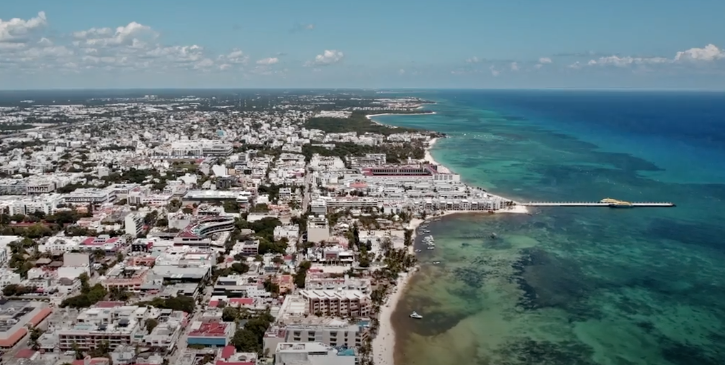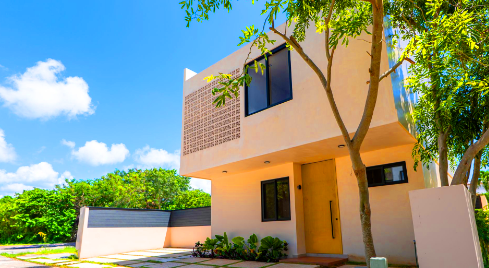Is Investing in Mexican Real Estate Secure? Top Safety Tips

Is It Safe to Buy Real Estate in Mexico? How Not to Get Scammed in Mexico
Is it safe to buy real estate in Mexico? Yes, but it’s essential to understand the legal requirements, potential risks, and how to avoid scams. This article will guide you through the necessary steps to ensure a safe and successful real estate investment.
Key Takeaways
- Foreigners can legally own property in Mexico through a Mexican Bank Trust (Fideicomiso) for residential properties in restricted zones or by forming a Mexican corporation for commercial properties.
- Conducting thorough due diligence, including title searches and working with qualified real estate professionals, is essential to avoid legal complications and ensure secure property transactions.
- Using a licensed real estate buyer's agent is essential for gaining access to all properties for sale in the Riviera Maya, including resales, new-construction, pre-construction properties, villas, houses, condos, and townhomes. Without a great agent, you may miss out on a comprehensive view of the market and the best real estate options available.
- Understanding financial considerations such as capital gains tax, property taxes, and closing costs is crucial for effective budgeting and avoiding unexpected expenses during the buying process.
- A good buyer's agent will also have a network of reliable contacts, including attorneys, immigration visa and residency specialists, tax accountants, furniture stores, interior decorators, and even doctors who make house calls for under $100 USD. Exceptional agents, backed by a strong real estate buyer's agency, can offer lifelong assistance, helping you not only with your purchase but also when it's time to sell your property when the time is right.
Understanding Property Ownership for Foreigners
 Foreigners can legally own property in Mexico, but it’s crucial to understand that Mexican laws distinguish between buying property and securing actual ownership. There are two main options for foreigners: establishing a Mexican Bank Trust (Fideicomiso) or forming a Mexican corporation. Each method comes with its own set of rules, benefits, and responsibilities.
Foreigners can legally own property in Mexico, but it’s crucial to understand that Mexican laws distinguish between buying property and securing actual ownership. There are two main options for foreigners: establishing a Mexican Bank Trust (Fideicomiso) or forming a Mexican corporation. Each method comes with its own set of rules, benefits, and responsibilities.
Certain types of land, such as 'Ejido' land and the 'Zona Federal Maritimo Terrestre' (Federal Maritime Land Zone), are not considered private property and have specific regulations and limitations for foreign buyers.
The Fideicomiso is a popular choice for residential property in restricted zones, while forming a Mexican corporation is often used for commercial property and certain types of land. Both options provide a secure legal framework for ownership, ensuring that foreign buyers can confidently purchase land and real estate in Mexico.
Bank Trust (Fideicomiso)
A Fideicomiso is a legal trust structure that allows foreigners to own property within Mexico’s restricted zones, which include land within 100 kilometers of the US border and 50 kilometers along the coastline. This system was established through legal amendments to provide a constitutional workaround for foreign ownership in these areas. Essentially, a Mexican bank acts as the trustee, holding the property under the bank’s name but managing it on behalf of the foreign beneficiary.
This arrangement provides a secure legal framework for ownership, similar to property ownership in other countries. In compliance with foreign assets control regulations, the foreign beneficiary retains all the rights associated with property ownership, including the ability to:
- improve
- build
- mortgage
- sell the property
The process involves initial setup fees, annual maintenance fees paid to the bank, and paying government fines, but these costs are a small price to pay for the peace of mind and legal protection it provides.
Mexican Corporations
Another option for foreigners is to form a Mexican corporation, which allows them to purchase commercial property and certain types of land within restricted zones. This method is particularly useful for those interested in buying commercial property, as it provides more flexibility and can be a viable route for investment in Mexico’s growing market.
By forming a corporation, foreign buyers can navigate the restrictions and still tap into lucrative real estate opportunities through foreign investment.
Legal Framework and Property's Legal Status
 Real estate transactions in Mexico are governed by state laws, specifically the Civil Codes of the 32 Mexican States. Public registries of property are regulated by local laws, and registration is essential for declaratory and publicity purposes. The Mexican government cannot arbitrarily take your land; issues of repossession typically arise from fraudulent property titles. Therefore, the registration of real estate rights is crucial to ensure clarity and legal protection.
Real estate transactions in Mexico are governed by state laws, specifically the Civil Codes of the 32 Mexican States. Public registries of property are regulated by local laws, and registration is essential for declaratory and publicity purposes. The Mexican government cannot arbitrarily take your land; issues of repossession typically arise from fraudulent property titles. Therefore, the registration of real estate rights is crucial to ensure clarity and legal protection.
Certain types of land, such as 'Ejido' land and the 'Zona Federal Maritimo Terrestre' (Federal Maritime Land Zone), are not considered private property and have specific regulations and limitations for foreign buyers.
Notaries play a vital role in these transactions by verifying key documents such as title deeds, lien certificates, and property-related bills. Once the property’s title is deemed clear, a meeting with a notary, the seller, attorney, or broker is required for closing the deal. Understanding the legal framework helps ensure a smooth and legally compliant transaction.
Title Search and Due Diligence
Conducting a thorough title search and due diligence is essential to avoid purchasing property with unclear title status or existing liens. Always verify the property’s legal status before proceeding with any transaction. Mexican notaries formalize real estate transactions through public deeds, ensuring that all legal requirements are met.
It is customary for attorneys in Mexico to handle these tasks because they often have a "special relationship" (bribe) with the registry office and can obtain the necessary information much easier. Their expertise and connections can expedite the process and ensure accuracy.
After obtaining the Deed the Attorneys:
- Visit the land registry office to confirm the transaction’s listing in their books.
- Look for a seal on each page and a certificate of registration after receiving the registered deed.
- Conduct due diligence to confirm that agrarian land is no longer under the ejido regime before purchase.
This comprehensive approach helps secure a property’s legal status and protects your investment, ensuring property values remain stable.
Role of Actual Lawyers
Hiring a qualified, bilingual real estate attorney is crucial for navigating the legal complexities of property transactions in Mexico. A lawyer can help ensure compliance with state-specific regulations and local laws. In Mexico, the Notary Public also plays a vital role in overseeing property transactions and ensuring all legal requirements are met.
Together, these professionals can guide you through the process, providing peace of mind and legal protection.
Common Risks and How to Mitigate Them
When buying property in Mexico, it’s important to be aware of common risks and know how to mitigate them. Natural hazards such as earthquakes, hurricanes, and floods should be considered when evaluating a property’s risk. Additionally, corruption and red tape can pose significant challenges. Working with experienced real estate professionals and lawyers who have established connections within the Mexican government can help navigate these issues.
Certain types of land, such as 'Ejido' land and the 'Zona Federal Maritimo Terrestre' (Federal Maritime Land Zone), are not considered private property and have specific regulations and limitations for foreign buyers.
As a foreign buyer, you should also be cautious of properties being sold at significantly lower prices, as these can often signal underlying legal issues. Thorough research and due diligence are essential to avoid falling into these traps. By taking these precautions, you can protect your investment and ensure a smooth buying process.
Timeshare Fraud Business
Timeshare fraud is a prevalent issue in Mexico, often involving high-pressure sales tactics and promises of unrealistic returns. To avoid falling victim to these scams, timeshare owners should:
- Check the legitimacy of the timeshare company
- Read reviews from previous customers
- Be cautious of sales representatives offering to buy back properties, as they may be posing as organized crime groups like the Jalisco New Generation cartel.
By doing your homework and verifying the company’s credibility, you can protect yourself from these fraudulent schemes. Spending time researching and reading reviews can save you from significant financial losses and legal headaches down the road.
Demand Upfront Fees
One common scam tactic involves sellers or agents demanding upfront fees. It’s advisable to:
- Use secure payment methods
- Avoid paying large sums in advance
- Use escrow services to protect buyers from scams involving upfront fees. This ensures that funds are only released when all contractual conditions are met, adding an extra layer of security to the transaction.
Wire Transfers and Bank Accounts
When conducting wire transfers, it’s crucial to verify bank account details directly with the seller or through a trusted intermediary to ensure safe financial transactions. Avoid using public Wi-Fi networks when conducting wire transfers, as this can reduce the risk of fraud.
Taking these precautions can help secure your financial transactions and protect your investment.
Financial Considerations and Taxes
Understanding the financial considerations and taxes involved in buying property in Mexico is crucial for making informed decisions. The capital gains tax rate for selling property in Mexico can be up to 35% of the profit, but this rate can be reduced based on how long the property is held and authorized deductions. It’s also important to be aware of the Property Acquisition Tax (ISAI), which varies by state and generally ranges from 2% to 5% of the property’s value.
Closing costs in Mexico typically range from 4% to 8% of the property’s sale price and are usually paid by the buyer. These costs include notary fees, escrow fees, and other miscellaneous expenses. By understanding these financial aspects, you can better plan your budget and avoid any unexpected expenses during the buying process.
Capital Gains Tax
Capital gains tax in Mexico can be as high as 35% of the profit from the sale of a residential property. However, there are exemptions and deductions available under certain conditions. For example, you are allowed to sell one property every three years without owing capital gains tax, provided it is your primary residence and you have a Mexican tax ID. Non-residents cannot claim this exemption.
Additionally, capital improvements and some closing costs can be deducted from the capital gains tax if official receipts (facturas) are provided. Understanding these exemptions and deductions can help reduce your tax liability and increase your net profit.
Property Taxes (Predial)
Property taxes (predial) in Mexico are relatively low compared to the United States and Canada. The average property tax rate is calculated to be around 0.1% of the assessed value. This means that property owners can expect to pay a small percentage of their property’s value in taxes each year. Annual property taxes must be paid every year before March 31, with discounts available if paid early.
For example, on a $65,000 condo in Quintana Roo, the annual property taxes are approximately $100 USD. These low property taxes make owning real estate in Mexico even more attractive.
Closing Costs
 Closing costs in Mexico typically range from 4% to 8% of the property’s sale price and are usually paid by the buyer. These costs include notary fees, escrow fees, and other miscellaneous expenses. Understanding these costs can help you better plan your budget and avoid any unexpected expenses during the buying process.
Closing costs in Mexico typically range from 4% to 8% of the property’s sale price and are usually paid by the buyer. These costs include notary fees, escrow fees, and other miscellaneous expenses. Understanding these costs can help you better plan your budget and avoid any unexpected expenses during the buying process.
Popular Destinations for Real Estate Investment
Mexico offers a variety of attractive locations for real estate investment, each with its unique charm and potential for high returns. Puerto Vallarta, Playa del Carmen, and Mexico City are among the top choices for both investors and expatriates. These destinations not only offer beautiful landscapes and vibrant cultures but also present excellent opportunities for property appreciation and rental income.
Some top locations for expats and digital nomads in Mexico are:
- Puerto Vallarta, renowned for its stunning beaches and vibrant nightlife
- Playa del Carmen, a hotspot for digital nomads with a high growth rate in real estate value and lower cost of living compared to the U.S.
- Mexico City, offering diverse neighborhoods and a steady demand for housing, making it an attractive investment location.
Puerto Vallarta
 Puerto Vallarta is a picturesque coastal city known for its stunning beaches, vibrant nightlife, and friendly expat community. Over the past decade, this city has seen staggering development, including a booming international airport with significant passenger growth. The new highway connecting Puerto Vallarta to Guadalajara is expected to further boost local tourism, making it an even more attractive destination for real estate investment.
Puerto Vallarta is a picturesque coastal city known for its stunning beaches, vibrant nightlife, and friendly expat community. Over the past decade, this city has seen staggering development, including a booming international airport with significant passenger growth. The new highway connecting Puerto Vallarta to Guadalajara is expected to further boost local tourism, making it an even more attractive destination for real estate investment.
One of the key advantages of investing in Puerto Vallarta is its walkability. The city offers a convenient bus system and cycle lanes, making it easy to get around without a car. Whether you’re looking for a vacation home or a rental property, Puerto Vallarta’s thriving tourism industry ensures a steady demand for real estate.
Playa del Carmen
Playa del Carmen has emerged as a prime location for real estate investment, thanks to its:
- High growth potential
- Vibrant atmosphere
- Significant increase in real estate values over the past decade
- Lower cost of living compared to the U.S.
- Appeal to digital nomads
These factors make it an attractive option for both investors and expatriates.
With its beautiful beaches and thriving community, Playa del Carmen offers a unique blend of lifestyle and investment opportunities.
Mexico City
Mexico City, the bustling capital of Mexico, provides diverse neighborhoods and a steady demand for housing, making it an attractive investment location. From luxury areas like Polanco and Santa Fe to more affordable options like Condesa, the city offers a range of investment opportunities.
The steady demand for housing from both locals and expats ensures that the real estate market remains robust, providing investors with a reliable and potentially profitable investment.
Safety Tips for Buying Real Estate in Mexico
Ensuring safety when buying real estate in Mexico involves several key steps:
- Verify the credentials of developers and real estate agents to ensure their credibility.
- Avoid ejido land, which cannot be privately owned by foreigners, to prevent complex and risky transactions.
- Understand legal recourse and government protections to provide additional peace of mind and security for foreign buyers.
Certain types of land, such as 'Ejido' land and the 'Zona Federal Maritimo Terrestre' (Federal Maritime Land Zone), are not considered private property and have specific regulations and limitations for foreign buyers.
By following these safety tips, you can navigate the real estate market in Mexico with confidence. Hiring a notary public to authenticate documents and ensuring that all transactions are registered legally is essential. Using reputable financial institutions with robust fraud protection measures can further secure your investment. Taking these precautions can help you avoid potential pitfalls and ensure a successful property purchase.
Verify Developer and Real Estate Agent Credentials
Verifying the developer’s track record and the real estate agent’s professional license is crucial for ensuring a safe transaction. Here are the steps to follow:
- Check past projects and seek reviews from previous buyers to gauge the developer’s reliability.
- Request the realtor’s professional license.
- Verify the license with the local real estate association to ensure they are legitimate and qualified to assist you.
By taking these steps, you can protect yourself from fraudulent schemes and ensure that you’re working with reputable professionals. This due diligence can save you from significant financial losses and legal issues in the long run.
Avoiding Ejido Land
 Ejido land is communal land that cannot be legally owned by foreigners. Ejido land is not considered private property and has specific regulations and limitations for foreign buyers. Transactions involving ejido land require community approval, making them complex and risky for buyers.
Ejido land is communal land that cannot be legally owned by foreigners. Ejido land is not considered private property and has specific regulations and limitations for foreign buyers. Transactions involving ejido land require community approval, making them complex and risky for buyers.
To avoid these complications, it’s best to steer clear of ejido land and focus on properties that can be legally owned and transferred.
Legal Recourse and Government Protections
Mexico provides a legal framework that allows buyers to seek recourse through the courts if their property rights are violated. The Federal Consumer Protection Agency (PROFECO) offers assistance by mediating disputes between buyers and sellers, ensuring fair practices in real estate transactions. Additionally, Mexico has specific laws to protect foreign investments, ensuring that foreign investors have similar rights to Mexican citizens when acquiring property.
Established dispute resolution systems, such as arbitration and mediation, provide mechanisms for resolving conflicts outside of the court system.
Summary
In summary, buying real estate in Mexico offers numerous opportunities but also comes with its share of challenges. By understanding the legal framework, conducting thorough due diligence, and being aware of common risks, you can make informed decisions and protect your investment. Whether you choose to invest in Puerto Vallarta, Playa del Carmen, Mexico City, or another popular destination, there are plenty of opportunities for growth and profit.
Taking the necessary precautions, such as verifying credentials, avoiding ejido land, and understanding legal protections, can ensure a smooth and successful property purchase. Armed with this knowledge, you can confidently navigate the Mexican real estate market and enjoy the many benefits it has to offer.











Comments (0)